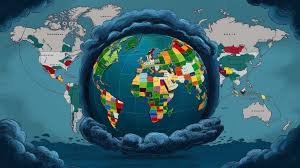The Geopolitical Implications of Climate Change: How Environmental Issues Are Shaping Global Politics in 2024

1. Introduction to Climate Change and Geopolitics
Climate change is no longer just an environmental issue; it has become a pivotal factor in global politics and international relations. As the world faces unprecedented environmental challenges, including rising temperatures, extreme weather events, and sea-level rise, the geopolitical landscape is being reshaped. In 2024, the interplay between climate change and global politics is influencing national security, economic stability, and international cooperation.
Understanding Climate Change Impacts: The effects of climate change are wide-ranging and profound. Increased frequency of natural disasters, such as hurricanes, wildfires, and floods, threatens both human life and infrastructure. Rising sea levels pose risks to coastal cities and island nations. These environmental changes create economic and social stresses, exacerbating existing conflicts and potentially leading to new geopolitical tensions.
2. Climate Change and National Security
Resource Scarcity and Conflict: One of the major geopolitical implications of climate change is the scarcity of essential resources. As climate change impacts agriculture, water supplies, and energy production, competition for these resources can lead to conflicts. For example, reduced water availability in arid regions like the Middle East and North Africa may heighten tensions between countries sharing transboundary water sources. The United Nations Environment Programme (UNEP) highlights that resource scarcity can exacerbate existing conflicts and create new flashpoints.
Migration and Displacement: Climate-induced migration is another significant issue. Rising sea levels and extreme weather events force populations to relocate, leading to internal displacement and international migration. This can strain neighboring countries and create geopolitical tensions, particularly in regions with already high levels of migration or political instability. The International Organization for Migration (IOM) projects that climate change could displace up to 200 million people by 2050, affecting global migration patterns and contributing to political tensions.
Military and Defense Strategies: Nations are increasingly incorporating climate change into their military and defense strategies. The U.S. Department of Defense has recognized climate change as a critical threat to national security, leading to adjustments in defense planning and resource allocation. Countries are also investing in climate-resilient infrastructure to protect military assets and ensure operational continuity in the face of environmental challenges.
3. International Cooperation and Climate Diplomacy
Global Agreements and Commitments: Addressing climate change requires international cooperation and strong global agreements. The Paris Agreement, adopted in 2015, represents a landmark commitment by nations to limit global warming and reduce greenhouse gas emissions. In 2024, countries are evaluating and strengthening their climate pledges to meet the goals set by the Paris Agreement. Collaborative efforts such as the United Nations Framework Convention on Climate Change (UNFCCC) negotiations and Climate Finance Initiatives are central to advancing global climate action.
Climate Change and Trade Policies: Climate change is also influencing international trade policies. Nations are implementing carbon pricing mechanisms, such as carbon taxes and cap-and-trade systems, to address emissions from industrial activities. Trade agreements and policies are increasingly incorporating environmental standards, with countries imposing tariffs on goods produced with high carbon footprints. For example, the European Union’s Carbon Border Adjustment Mechanism aims to prevent carbon leakage by imposing tariffs on imports from countries with less stringent climate policies.
Climate-Induced Technological Innovations: Innovation in climate technology is playing a crucial role in addressing environmental challenges and shaping geopolitical dynamics. Advances in renewable energy, carbon capture and storage, and climate-resilient infrastructure are critical for reducing emissions and adapting to climate impacts. Countries leading in these technologies, such as China and Germany, are positioning themselves as global leaders in the transition to a low-carbon economy.
4. Challenges and Future Directions
Inequality and Climate Justice: One of the challenges in addressing the geopolitical implications of climate change is ensuring equity and climate justice. Developing countries, which are often the most vulnerable to climate impacts, face significant challenges in adapting to environmental changes. Ensuring that climate action supports the needs of vulnerable populations and promotes fair access to resources and technologies is crucial for achieving global climate goals.
Geopolitical Rivalries and Climate Policy: Geopolitical rivalries may affect climate policy and international cooperation. Competing national interests and strategic considerations can hinder collective action on climate change. Navigating these rivalries while advancing global climate solutions requires diplomatic efforts and a focus on shared interests and mutual benefits.
Long-Term Climate Strategies: Developing and implementing long-term climate strategies that balance environmental, economic, and geopolitical considerations is essential. Countries need to integrate climate resilience into their national policies, infrastructure planning, and international relations. Emphasizing collaboration, innovation, and sustainable development will be key to addressing the complex challenges posed by climate change.
In conclusion, the geopolitical implications of climate change are profound and far-reaching. The impacts on national security, resource scarcity, migration, and international cooperation are reshaping global politics in 2024. Addressing these challenges requires a collaborative approach, innovative solutions, and a commitment to climate justice and sustainability.





